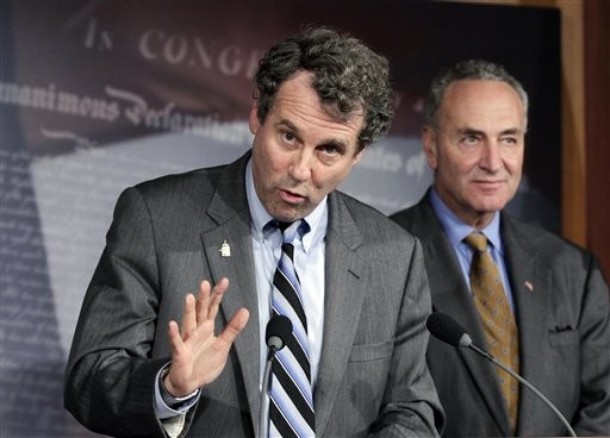
Not for nothing is election season in Washington called “silly season.” The latest example is the China currency bill pushed by co-sponsors Senators Charles Schumer (D-NY) and Sherrod Brown (D-OH) and supported by many Republicans. The proposed legislation, which blames the loss of millions of American jobs on China’s currency manipulation, may play well with domestic constituencies, but it risks a damaging trade war with China at a time the fragile world economy can least afford it.
Members of Congress, Schumer in particular, have argued for some time that China has engaged in unfair trading practices with the US and other countries. To put things right, the bipartisan legislation they have unveiled will levy tariffs on Chinese imports in the hope that they will prod Beijing to raise the value of its currency.
Their complaint is not groundless. Among other things, China has illegally subsidized its exports, failed to protect intellectual property rights, and established indigenous innovation policies that exclude outsiders from that country’s procurement market. The undervalued renminbi (RMB) has further subsidized Chinese trade, no doubt resulting in the closure of some American manufacturing concerns and the loss of jobs.
Precisely how many jobs have been lost because of China’s unfair practices is unclear. The Economic Policy Institute estimates that they have cost the US 2.8 million jobs. Perhaps. But many of the jobs in industries such as toys, games, and textiles would have disappeared in any event because of lower labor costs in China and other emerging markets. The United States used to be the world’s major supplier of steel and televisions, too, until it was supplanted in the 1970s by Japan, whose efficient and low-cost production gave it a comparative advantage over American producers. For the same reason, today it is China that enjoys the advantage in the production of steel, televisions, DVDs, and other electronic equipment. Vietnam may be tomorrow’s low-cost producer.
China has not been indifferent to concerns about the exchange rate of its currency. To be sure, from 1994 to 2005 it pegged the RMB to the dollar at a constant rate to promote stable trade and investment. Beginning in 2005, however, it adopted a managed float. It allowed its exchange rate to adjust in relation to the value of a basket of currencies but intervened in the marketplace to ensure that its rise would not exacerbate income inequality and create potentially massive social instability. Still, from 2005 until the onset of the global recession in 2008, the RMB increased by around 20 percent against the dollar. Since 2010, when Beijing resumed its measured revaluation, the RMB has increased another 6 percent. The real value of the RMB is actually higher because of soaring inflation in China, driven in part by the rising cost of labor, which has recently declined from 6.5 to 6.2 percent. Chinese leaders are not indifferent to the social consequences of this inflationary spiral, and there are indications that Beijing is intent on rebalancing its growth by shifting resources from external to internal markets.
For Schumer and his congressional colleagues and other apparent converts to protectionism from economist Paul Krugman to Republican presidential candidate Mitt Romney, China is moving much too slowly. Even Ben Bernanke, chairman of the Federal Reserve, has said that Chinese currency manipulation is blocking America’s economic recovery. There is an undeniable need for a systematic policy that will challenge China’s managed trade, perhaps something along the lines of the Strategic Impediments Initiative the administration of George H.W. Bush employed to resolve trade disputes with Japan in the 1980s. The protectionist anti-China trade bill is not the way to do it. Clearly unwilling to compromise their differences in the interest of jump-starting the economy and creating jobs, Schumer and company have chosen to make China the scapegoat for America’s economic ills rather than undertake the hard task of rebalancing the American economy.
Election-year politics aside, imposing tariffs to pressure China into revaluing its currency is not likely to lead to a resurgence of manufacturing jobs in the US. American corporations that have set up shop in China will simply move their factories to other low-wage countries. Even if the RMB rapidly accelerated, factor costs in China will still be lower than those in the US. A strengthened RMB that becomes an international currency is also likely to displace the dominance of the dollar in Asian regional economies and thus make it more difficult to fund US government deficits.
In the end, this ill-advised legislation is hardly likely to prod China into revaluing its currency, even though it is China’s interest to do so to contain inflation and reduce the bubble in real estate prices. The imposition of duties on Chinese goods is more far more likely to trigger an international trade war and the beggar-thy-neighbor policies of the 1930s. Worse still, it will put China and the US on a confrontational path that could lead to a renewed cold war.
Hugh De Santis is a strategic analyst and consultant. He is a former career officer in the Department of State and senior official at the Carnegie Endowment for International Peace and the RAND Corporation. Photo credit: AP Photo.
Image: brownschumer.jpg
